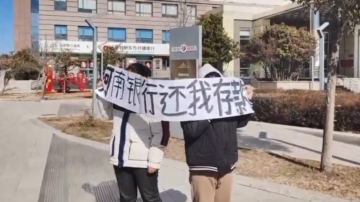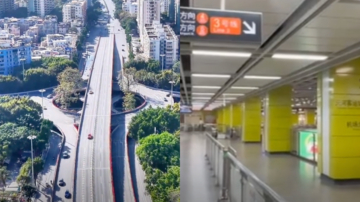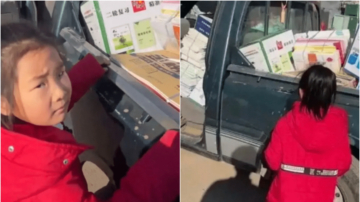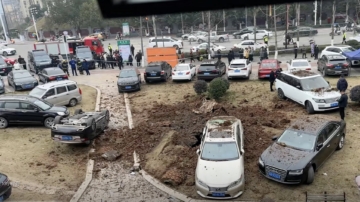【新唐人2014年07月29日訊】中國由於中共實施「一胎化」的所謂「計劃生育政策」,從1999年開始,中國社會快速進入了老齡化。2004年底,中國65歲以上的人口佔總人口的 7.6%。2011年底,中國60歲老齡人口已達到1億8500萬,預計到2030年,全中國60歲以上的人口大約有3億5000萬。如何看待和解決中國的養老問題,一起去聽聽民眾和學者的想法。
在1949年之前,中國人幾千年來都是採用家庭養老的模式。從1980年代開始,中共實行「一胎化」所謂的「計劃生育政策」,導致21世紀後,成年的獨生子女必須一人扛起父母兩人的養老問題。
原雲南企業家朱承志:「困難應該是相當的大,農村的或者是城市裡邊沒有養老收入的,沒有退休金。再一個,人老了難免體弱多病,在目前醫院已經不是救死扶傷的地方,醫院就是搶錢的地方。你說:夫妻2個要來承擔上有老、下有小,再碰上搶錢的醫院,那他們怎麼能夠承擔?」
與傳統模式相對應的是社保基金模式。上週,大陸官方的審計署發表了2013年年度報告,曝光了「社保基金」理事會管理的自營指數化投資組合,在過去幾年中虧損70億人民幣。
目前中國大陸中共官員和公務員的退休金和醫療保險等由政府負擔,其他公民則需要每個月按工資收入的比例,繳納「社保金」,也就是老百姓所說的「五險一金」。這些錢一般由地方政府管理。很多民眾對中共的「社保基金」的黑箱管理非常不滿,從往年的經驗看,一旦發生虧空,老百姓必須自己承擔,抗議、申訴都無法解決。
北京師範大學MBA導師段紹譯:「這個是沒法討的。一方面這個養老金是被政府官員、有權力的人挪用到另外的地方去了,第二個方面就是它沒有專門的投資機構,沒有讓這些養老金能夠升值。管理得好的話,它這個基金是可以生錢的。它不但沒有升值而且縮水。」
除了「社保基金」大陸當局近年來推出多個養老模式,大多引起民間反彈。如「以房養老」,就是擁有住房完整產權的老人,可將房屋抵押給保險公司,並按照約定條件定期領取養老金直到去世。但去世後房產的處置權歸保險公司,而不是老人的子女。民間普遍的反應是:工作了一輩子,沒人管養老,就夠不講理的了,還要把一生節衣縮食賺錢買的房子搶走,政府真是「吃人不吐骨頭」!
大陸各城鎮近年來還興建了一些養老院。但高昂的價格,一般民眾無法承受。
朱承志:「養老院普遍來說,收費都比較偏高,承擔不了。比如我家老太太(母親)都快100歲了,我3月份去成都,接譚作人,我不得以把老太太送到了養老院。雖說只是10來天,但對這個事情感觸比較深。」
中共在1949年建政前,曾大力宣傳所謂「共產主義」的「人間天堂」理論,其中包括「物質極大豐富」、「老有所養」等。事實上,大陸各歷史階段的老人們所經歷的與共產理論完全相反。上世紀60年代「大饑荒」中,首當其衝被餓死的就是老人、小孩。現在所謂改革開放30年後,「老失所養」成為民間社會最大的憂慮之一。
段紹譯:「政府承擔,首先它要有這方面的財力,另外他們有這個動機。目前來講這兩樣東西他們是不足的。說完全沒這個財力,也不能這麼說。這個國家反正是有錢,但是它把錢用到哪裡?第二點,中國不是民選的政府,它給大家管好這個事,官員沒有甚麼好處,所以他沒有做好這個事的動力。」
據預測,到2030年全中國人口總數將達到大約15億,60歲以上人口大約有3億5000萬,佔總人口的1/4。如何解決中國的養老問題﹖《新唐人》評論員趙培表示,反腐、改革這些好聽的名詞不能養老,不能帶來公平,只是中共黨內利益分配的調正而已。想要公平待遇必須中共下臺。
採訪編輯/唐音 後製/鍾元
Major Issues With Chinese Pension System Exposed: Retirement System Failure
Since the so-called Family Planning Policy, which allows only
one-child, has been carried out, Chinese society quickly aged.
By the end of 2004, 7.6 percent of China's total population
is age 65 and over.
By the end of 2011 China had 185 million people
age 60 and over.
It is forecast that in 2030, China will have 350 million
elderly people age 60 and over.
So how should China's pension problem be solved?
Let's see what the experts and the people are saying.
For thousands of years before 1949, family support
of elderly people in China existed.
Beginning in the 1980s, the Chinese Communist Party (CCP)
implemented the so-called family planning policy
which only permitted one child per family, resulting
in elderly-care issues.
In the 21st century the sole child has to take on
the responsibility of supporting both parents.
Former Yunnan entrepreneur Zhu Chengzhi:
"The difficulty should be quite serious.
In rural or urban areas, elderly people are without
retirement income or a pension.
In addition, elderly people are inevitably frail and weak
with a lot of illness, but currently hospitals are places
for robbing money rather than healing the wounded
and rescuing the dying.
So can you imagine, the young couple has to bear
the burden of supporting both their parents and child,
incorporating hospital expenses for their elderly parents.
How can they bear it?"
The alternative method for the traditional family-support
of elderly is the social security fund support model.
Last week, the CCP Audit Bureau published the 2013
annual report exposing the loss of seven billion RMB
over the past few years of the self-indexation portfolio
managed by the National Social Security Fund (NSSF).
Currently in China, the pension and health insurance
of officials and civil servants are paid by the governments.
But other citizens have to pay monthly social security funds
by a certain proportion of wage income, the so-called
six social security payments (funds).
All these funds are generally managed
by the local governments.
Many people are very unhappy with the CCP's
black-box management by the NSSF.
From previous years experience, once the deficit occurs,
the fund-payers must assume the loss by themselves.
Protests and complaints have all gone in vain.
Beijing Normal University MBA tutor Mr Duan Shaoyi:
"There is no way to recover the loss.
On the one hand, the pension funds have been diverted
to other fields by powerful government officials.
On another hand, there is no dedicated investment agency
to appreciate these pensions.
If they are well managed, then these funds are able
to generate more money.
However, these funds currently failed
to appreciate and even depreciated."
In addition to the NSSF, Mainland Authorities have launched
a number of pension models in recent years.
Most of them have been opposed by the people.
Supporting the elderly via their own house means the elderly
have full property rights for mortgaged through insurance
company, and in accordance with the agreed conditions
pensioners regularly receive pension until death.
But after their death, insurance companies will control
the right to dispose of property rather than the next of kin.
Thus, the common response from the people includes
working through lifetime and nobody responsible
for the pensions are considerably unreasonable;
Furthermore the owned houses which were bought
by lifetime saving will be also finally taken away,
and hence the government is really
"eating people without spitting out the bones!"
Retirement centers have been built in many cities
and towns in China in recent years.
But the general public cannot afford the large expense.
Zhu Chengzhi: "In general, the charges in retirement centers
are relatively high and unaffordable.
For example, my mother is almost 100 years old.
In March of this year, when I went to Chengdu to pick up
Tan Zuoren, I had to send my mother to a nursing home.
Despite it having been only 10 days, I still have
relatively deep feelings on this matter."
Before 1949, the CCP government vigorously promoted
the "paradise on earth" theory with so-called communism,
including the sayings "great wealth of products,"
"pension security for the elders" and others.
In fact, the existing historical stages which old people have
experienced are completely opposite to communist theory.
During the Great Famine of the 1960s, the first groups
of people who starved to death were the elderly and children.
Now after 30 years of implementing reform and opening up,
the so-called "pension security for elders"
has become one of the biggest concerns of the society.
Duan Shaoyi: "If governments are responsible for pensions,
there first needs to be enough financial ability,
plus they have to have the motivation.
But currently, two such aspects are both inadequate.
We cannot completely say they have no financial ability.
This country has money, but where did the money go?
Secondly, China is not a democratically elected government.
There are no benefits to the officials in managing well
and solving this matter so they have no motivation
to deliver well on the task."
It is predicted that by 2030, the entire Chinese population
will reach about 1.5 billion with 350 million age 60 and over,
which accounts for one fourth of the total population.
How should China's pension problem be solved?
NTD commentator Zhao Pei said such good anti-corruption
and reform terms cannot offer pensions for the elderly.
Neither is it fair.
They actually just re-distribute the interests
among the different components of the CCP.
If fair treatment is desired, the CCP must step down.
Interview & Edit/Tangyin Post-Production/ZongYuan
在1949年之前,中國人幾千年來都是採用家庭養老的模式。從1980年代開始,中共實行「一胎化」所謂的「計劃生育政策」,導致21世紀後,成年的獨生子女必須一人扛起父母兩人的養老問題。
原雲南企業家朱承志:「困難應該是相當的大,農村的或者是城市裡邊沒有養老收入的,沒有退休金。再一個,人老了難免體弱多病,在目前醫院已經不是救死扶傷的地方,醫院就是搶錢的地方。你說:夫妻2個要來承擔上有老、下有小,再碰上搶錢的醫院,那他們怎麼能夠承擔?」
與傳統模式相對應的是社保基金模式。上週,大陸官方的審計署發表了2013年年度報告,曝光了「社保基金」理事會管理的自營指數化投資組合,在過去幾年中虧損70億人民幣。
目前中國大陸中共官員和公務員的退休金和醫療保險等由政府負擔,其他公民則需要每個月按工資收入的比例,繳納「社保金」,也就是老百姓所說的「五險一金」。這些錢一般由地方政府管理。很多民眾對中共的「社保基金」的黑箱管理非常不滿,從往年的經驗看,一旦發生虧空,老百姓必須自己承擔,抗議、申訴都無法解決。
北京師範大學MBA導師段紹譯:「這個是沒法討的。一方面這個養老金是被政府官員、有權力的人挪用到另外的地方去了,第二個方面就是它沒有專門的投資機構,沒有讓這些養老金能夠升值。管理得好的話,它這個基金是可以生錢的。它不但沒有升值而且縮水。」
除了「社保基金」大陸當局近年來推出多個養老模式,大多引起民間反彈。如「以房養老」,就是擁有住房完整產權的老人,可將房屋抵押給保險公司,並按照約定條件定期領取養老金直到去世。但去世後房產的處置權歸保險公司,而不是老人的子女。民間普遍的反應是:工作了一輩子,沒人管養老,就夠不講理的了,還要把一生節衣縮食賺錢買的房子搶走,政府真是「吃人不吐骨頭」!
大陸各城鎮近年來還興建了一些養老院。但高昂的價格,一般民眾無法承受。
朱承志:「養老院普遍來說,收費都比較偏高,承擔不了。比如我家老太太(母親)都快100歲了,我3月份去成都,接譚作人,我不得以把老太太送到了養老院。雖說只是10來天,但對這個事情感觸比較深。」
中共在1949年建政前,曾大力宣傳所謂「共產主義」的「人間天堂」理論,其中包括「物質極大豐富」、「老有所養」等。事實上,大陸各歷史階段的老人們所經歷的與共產理論完全相反。上世紀60年代「大饑荒」中,首當其衝被餓死的就是老人、小孩。現在所謂改革開放30年後,「老失所養」成為民間社會最大的憂慮之一。
段紹譯:「政府承擔,首先它要有這方面的財力,另外他們有這個動機。目前來講這兩樣東西他們是不足的。說完全沒這個財力,也不能這麼說。這個國家反正是有錢,但是它把錢用到哪裡?第二點,中國不是民選的政府,它給大家管好這個事,官員沒有甚麼好處,所以他沒有做好這個事的動力。」
據預測,到2030年全中國人口總數將達到大約15億,60歲以上人口大約有3億5000萬,佔總人口的1/4。如何解決中國的養老問題﹖《新唐人》評論員趙培表示,反腐、改革這些好聽的名詞不能養老,不能帶來公平,只是中共黨內利益分配的調正而已。想要公平待遇必須中共下臺。
採訪編輯/唐音 後製/鍾元
Major Issues With Chinese Pension System Exposed: Retirement System Failure
Since the so-called Family Planning Policy, which allows only
one-child, has been carried out, Chinese society quickly aged.
By the end of 2004, 7.6 percent of China's total population
is age 65 and over.
By the end of 2011 China had 185 million people
age 60 and over.
It is forecast that in 2030, China will have 350 million
elderly people age 60 and over.
So how should China's pension problem be solved?
Let's see what the experts and the people are saying.
For thousands of years before 1949, family support
of elderly people in China existed.
Beginning in the 1980s, the Chinese Communist Party (CCP)
implemented the so-called family planning policy
which only permitted one child per family, resulting
in elderly-care issues.
In the 21st century the sole child has to take on
the responsibility of supporting both parents.
Former Yunnan entrepreneur Zhu Chengzhi:
"The difficulty should be quite serious.
In rural or urban areas, elderly people are without
retirement income or a pension.
In addition, elderly people are inevitably frail and weak
with a lot of illness, but currently hospitals are places
for robbing money rather than healing the wounded
and rescuing the dying.
So can you imagine, the young couple has to bear
the burden of supporting both their parents and child,
incorporating hospital expenses for their elderly parents.
How can they bear it?"
The alternative method for the traditional family-support
of elderly is the social security fund support model.
Last week, the CCP Audit Bureau published the 2013
annual report exposing the loss of seven billion RMB
over the past few years of the self-indexation portfolio
managed by the National Social Security Fund (NSSF).
Currently in China, the pension and health insurance
of officials and civil servants are paid by the governments.
But other citizens have to pay monthly social security funds
by a certain proportion of wage income, the so-called
six social security payments (funds).
All these funds are generally managed
by the local governments.
Many people are very unhappy with the CCP's
black-box management by the NSSF.
From previous years experience, once the deficit occurs,
the fund-payers must assume the loss by themselves.
Protests and complaints have all gone in vain.
Beijing Normal University MBA tutor Mr Duan Shaoyi:
"There is no way to recover the loss.
On the one hand, the pension funds have been diverted
to other fields by powerful government officials.
On another hand, there is no dedicated investment agency
to appreciate these pensions.
If they are well managed, then these funds are able
to generate more money.
However, these funds currently failed
to appreciate and even depreciated."
In addition to the NSSF, Mainland Authorities have launched
a number of pension models in recent years.
Most of them have been opposed by the people.
Supporting the elderly via their own house means the elderly
have full property rights for mortgaged through insurance
company, and in accordance with the agreed conditions
pensioners regularly receive pension until death.
But after their death, insurance companies will control
the right to dispose of property rather than the next of kin.
Thus, the common response from the people includes
working through lifetime and nobody responsible
for the pensions are considerably unreasonable;
Furthermore the owned houses which were bought
by lifetime saving will be also finally taken away,
and hence the government is really
"eating people without spitting out the bones!"
Retirement centers have been built in many cities
and towns in China in recent years.
But the general public cannot afford the large expense.
Zhu Chengzhi: "In general, the charges in retirement centers
are relatively high and unaffordable.
For example, my mother is almost 100 years old.
In March of this year, when I went to Chengdu to pick up
Tan Zuoren, I had to send my mother to a nursing home.
Despite it having been only 10 days, I still have
relatively deep feelings on this matter."
Before 1949, the CCP government vigorously promoted
the "paradise on earth" theory with so-called communism,
including the sayings "great wealth of products,"
"pension security for the elders" and others.
In fact, the existing historical stages which old people have
experienced are completely opposite to communist theory.
During the Great Famine of the 1960s, the first groups
of people who starved to death were the elderly and children.
Now after 30 years of implementing reform and opening up,
the so-called "pension security for elders"
has become one of the biggest concerns of the society.
Duan Shaoyi: "If governments are responsible for pensions,
there first needs to be enough financial ability,
plus they have to have the motivation.
But currently, two such aspects are both inadequate.
We cannot completely say they have no financial ability.
This country has money, but where did the money go?
Secondly, China is not a democratically elected government.
There are no benefits to the officials in managing well
and solving this matter so they have no motivation
to deliver well on the task."
It is predicted that by 2030, the entire Chinese population
will reach about 1.5 billion with 350 million age 60 and over,
which accounts for one fourth of the total population.
How should China's pension problem be solved?
NTD commentator Zhao Pei said such good anti-corruption
and reform terms cannot offer pensions for the elderly.
Neither is it fair.
They actually just re-distribute the interests
among the different components of the CCP.
If fair treatment is desired, the CCP must step down.
Interview & Edit/Tangyin Post-Production/ZongYuan








